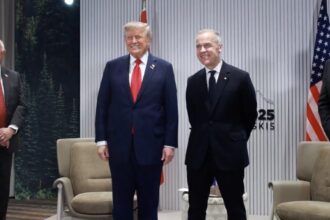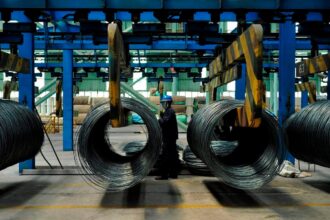In a dramatic escalation of global trade tensions, president-elect Donald Trump announced sweeping new tariffs targeting the European Union and Mexico, set to take effect August 1, 2024. The 30 percent blanket tariffs mark one of the most aggressive trade actions in recent U.S. history and signal Trump’s renewed commitment to his “America First” economic agenda.
“These nations have taken advantage of the United States for decades,” Trump declared during his announcement from Mar-a-Lago. “The days of unfair trade practices against American workers and businesses are over.”
The proposed tariffs would apply to virtually all imports from the European Union’s 27 member states and Mexico, potentially affecting hundreds of billions in trade. According to economic analysts at Goldman Sachs, the sweeping measures could increase consumer prices on everything from German automobiles and Italian wines to Mexican produce and manufactured goods.
European Commission President Ursula von der Leyen responded swiftly, calling the tariff announcement “deeply concerning” and warning of potential retaliatory measures. “The EU stands ready to defend its economic interests if these threats materialize,” she stated in Brussels.
Financial markets reacted immediately to the news, with the S&P 500 dropping 1.8% and the euro falling against the dollar. Industries particularly vulnerable to trade disruptions, including automotive, agriculture, and consumer goods, saw sharper declines.
For Canada, the announcement brings mixed implications. While Canadian exports appear to have been spared in this round of tariffs, economists warn that disrupted supply chains and potential market shifts could still impact the Canadian economy indirectly.
“Even without direct tariffs on Canadian goods, we’re looking at significant disruption to integrated North American supply chains,” explains Dr. Elaine Chen, international trade economist at the University of Toronto. “Many Canadian manufacturers depend on components that cross the U.S.-Mexico border multiple times.”
The announcement has particular resonance in Canadian politics, where Prime Minister Justin Trudeau has worked to maintain positive trade relations with both the U.S. and European partners. Trudeau’s office issued a measured statement, noting that while Canada wasn’t targeted directly, the government would “closely monitor developments and support affected Canadian industries.”
Mexico’s President Claudia Sheinbaum responded more forcefully, calling the tariffs “unacceptable” and promising “proportional responses.” Mexico is particularly vulnerable as approximately 80% of its exports go to the United States, representing nearly 30% of the country’s GDP.
Economic analysts suggest these tariffs could reshape global trade patterns significantly. “We’re potentially looking at a fundamental reconfiguration of global business relationships,” says Martin Rodriguez, chief economist at BMO Capital Markets. “Companies will need to rethink supply chains, potentially relocating production or seeking alternative markets.”
Critics of the tariffs, including many business leaders, warn they could backfire on American consumers. The U.S. Chamber of Commerce estimates the measures could increase costs for the average American household by $1,700 annually as importers pass on higher costs.
Meanwhile, some manufacturing advocates have praised the move. United Steelworkers president Thomas Conway stated that “decisive action is needed to level the playing field for American workers who have suffered from unfair trade for too long.”
As world markets digest this development, a critical question emerges: Will these aggressive trade measures actually strengthen American manufacturing and jobs as promised, or will they instead trigger a damaging cycle of retaliation and economic isolation that ultimately hurts the very workers they aim to protect?










